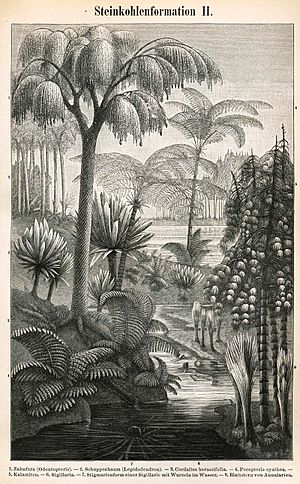Coal forest facts for kids

Coal forests were vast wetlands that covered large parts of Earth's tropical lands. This was during ancient times, specifically the late Carboniferous period and Permian period.
Back then, most continents were joined together in a huge landmass called Gondwana. These areas received lots of tropical rain. When plants from these forests died, they formed thick layers of peat. Over millions of years, this peat turned into the coal we use today. Even though the continents have moved apart, the coalfields they left behind are still there.
The plants in these coal forests took in a lot of carbon dioxide from the air through photosynthesis. This process released a lot of oxygen into the atmosphere. The oxygen levels might have reached as high as 35%! This made the air easier to breathe for animals, especially those with simpler respiratory systems. It might even explain why ancient insects like Meganeura (a giant dragonfly) were so much bigger than modern ones.
These ancient forests grew in tropical areas like what we now call Europe, eastern North America, and parts of Africa (together known as Euramerica). They also thrived in China.
Why the Coal Forests Changed
Over time, the climate changed, becoming cooler and drier. This caused a big event called the Carboniferous rainforest collapse. The cooler, drier weather broke up the large rainforests. This climate change was likely caused by mountain uplift, where continental plates pushed against each other.
After this collapse, coal forests were mostly found in North America (like the Appalachian Mountains and Illinois coal basins) and central Europe.
Towards the very end of the Carboniferous period, the coal forests grew back, especially in eastern Asia, like China. However, they never fully recovered in Euramerica. The Chinese coal forests continued to flourish well into the Permian period.
Plants Found in Coal Forests
Many different kinds of plants grew in these ancient forests. Their remains formed the coal we find today.
- Glossopteris
- Calamites
- Lepidodendron
- Sphenopsida (a group of plants like horsetails)
- Pteridosperms (plants that looked like ferns but had seeds)
- Ferns
Images for kids
-
Coal forest of tree ferns and lycopod trees, in a 1906 artist's rendering
See also
 In Spanish: Bosque de carbón para niños
In Spanish: Bosque de carbón para niños
 | Sharif Bey |
 | Hale Woodruff |
 | Richmond Barthé |
 | Purvis Young |



